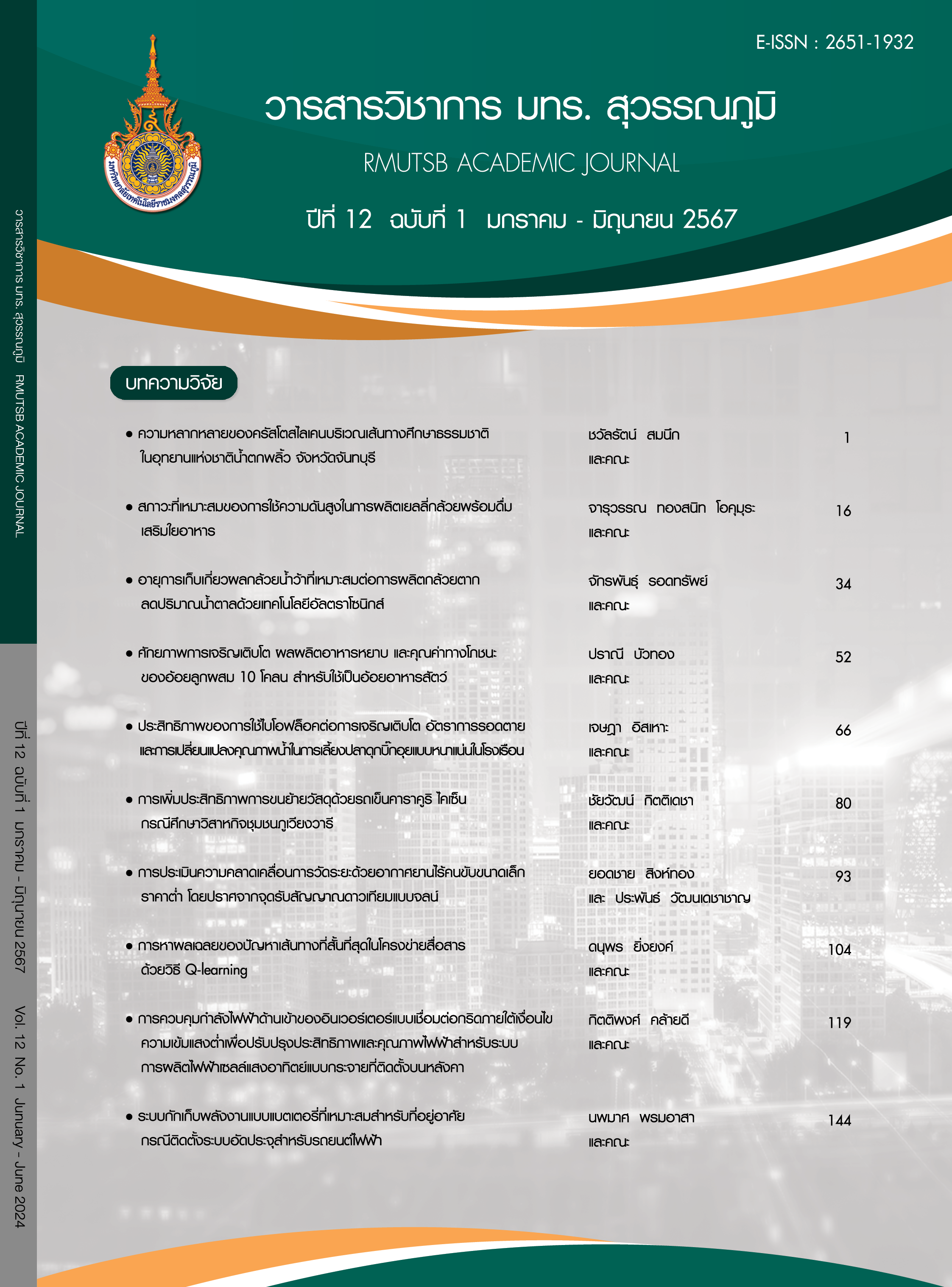Appropriate battery energy storage system for house-based in case of charging system for EV installation
Main Article Content
Abstract
This paper presents the analysis of the battery energy storage system (BESS) appropriating for a house-based on installation of a charging system for electric vehicle (EV). The charging system taps into both the Metropolitan Electricity Authority's (MEA) low-voltage power grid, and a rooftop solar photovoltaic system. By using data on the daily electrical energy demand (load profile), the total electrical energy consumption was 20.39 kWh/day, which was used to simulate and analyze an appropriate battery energy storage system by using the DIgSILENT PowerFactory program. In the case of installing a charging system for electric vehicles (electric vehicles: EV), the portable charge rate of an electric vehicle was 3.60 kW (current 16.00 A), which an average daily energy consumption of 37.20 kWh with an average daily residential electricity consumption of 20.39 kWh. All loads were connected to a 5.00 kWp rooftop solar power generation system and the MEA's low-voltage grid. Results of simulation and analysis found that the load use of rooftop solar generation system during daytime was 6.04 kWh, and battery energy storage system suitable for storing remaining energy from solar rooftop production was 18.52 kWh, which can reduce the average daily electrical energy consumption from 57.60 kWh down to 33.04 kWh.
Article Details

This work is licensed under a Creative Commons Attribution-NonCommercial-NoDerivatives 4.0 International License.
Published manuscript are the rights of their original owners and RMUTSB Academic Journal. The manuscript content belongs to the authors' idea, it is not the opinion of the journal's committee and not the responsibility of Rajamangala University of Technology Suvarnabhumi
References
Boonsri, U., Klongjai, A., Ingrad, C., Kuathaweekul, T., & Klungsida, N. (2021). The design and installation of on grid systems 3.3 kW for hydroponics melon. 14th Thailand Renewable Energy for Community Conference (pp. 512-517). Chiang Mai: Maejo University. (in Thai)
Chaivanich, K., & Sedpho, S. (2018). An evaluation method of greenhouse gas reduction by the installation of a photovoltaic cells system: Case study of smart grid network in the University of Phayao. RMUTSB Academic Journal, 6(2), 194-206. (in Thai)
Kamkate, A., & Kaeokla, P. (2019). Feasibility of investment in electric vehicle charging stations. EAU Heritage Journal Social Science and Humanity, 9(3), 227-235. (in Thai)
Khemmook, P., Thongsuk, S., & Inban, P. (2022). The impact study of electric vehicle quick charger to electrical system for business in private sector. The Journal of King Mongkut's University of Technology North Bangkok, 32(4), 843-853. (in Thai)
Ludsui, M., Khobkhan, P., Kunkiang, V., & Pothi, N. (2021). Design and development of prototype electric vehicle. Journal of Science, Engineering and Technology, 1(1), 19-29. (in Thai)
Maeraekache, H., & Boonprasert P. (2017). Impact of high solar rooftop photovoltaic penetration on voltage and energy loss in distribution systems. The 15th Graduate Research Conferences 2017 (pp. 362-373). Khon Kaen: Khon Kaen University. (in Thai)
Mitsanon, S., Kantaphon, L., & Wamae, W. (2021). Feasibility study of electricity production system using Floating Solar: A case study of Wang Din Sor Village, Phitsanulok Province. Journal of Industrial Technology Ubon Ratchathani Rajabhat University, 11(2), 81-91. (in Thai)
Suechoey, B., Siriporananon, S., & Boonprasert, P. (2021). The discharge time analysis of the battery energy storage system to reduce the peak demand. Kasem Bundit Engineering Journal, 11(1), 22-37. (in Thai)
Suechoey, B., Siriporananon, S., & Wannaraj, O. (2022). Impact analysis of a solar rooftop with batteries installed on the roof of an organic fertilizer plant. Kasem Bundit Engineering Journal, 12(2), 51-66. (in Thai)
Samsri, T., & Phaisangittisagul, E. (2015). Optimal real-time PEVs charging scheduling for enhancing energy management by maintaining power system peak demand. UBU Engineering Journal, 8(1), 77-90. (in Thai)


